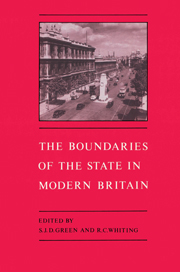Book contents
- Frontmatter
- Contents
- List of figures
- List of tables
- List of contributors
- Acknowledgements
- 1 Introduction: the shifting boundaries of the state in modern Britain
- Part I The state and political theory
- 2 Political thought and the state
- 3 ‘Boundaries’ in theoretical language about the British State
- 4 The twilight of the British state?: Henry Dubb versus sceptred awe
- 5 Thinking about the state and the economy
- Part II The economy
- Part III Welfare and social policy
- Part IV Conflict and order
- Part V Religion and morality
- Index
4 - The twilight of the British state?: Henry Dubb versus sceptred awe
Published online by Cambridge University Press: 18 March 2010
- Frontmatter
- Contents
- List of figures
- List of tables
- List of contributors
- Acknowledgements
- 1 Introduction: the shifting boundaries of the state in modern Britain
- Part I The state and political theory
- 2 Political thought and the state
- 3 ‘Boundaries’ in theoretical language about the British State
- 4 The twilight of the British state?: Henry Dubb versus sceptred awe
- 5 Thinking about the state and the economy
- Part II The economy
- Part III Welfare and social policy
- Part IV Conflict and order
- Part V Religion and morality
- Index
Summary
‘I have changed everything’, Mrs Thatcher is supposed to have said in 1976. For long her claim was taken at face value, by outraged opponents no less than by eager supporters. Her fall, and the misadventures of her successor, have brought a new perspective. Post-Thatcher Britain is beginning to look suspiciously like pre-Thatcher Britain; the supposedly transformed state of the revolutionaries like the unregenerate state of the ancien régime. In this essay, I explore the possible reason for this curious state of affairs. I suggest that its origins may lie in the hold on the imaginations of the British political class of three competing visions of the British state, all of which have deep roots in British history, but all of which have been emptied by the upheavals of the last twenty years or so. I conclude with the hope – for it is only a hope – that a fourth and more promising vision, equally venerable, but in this century less influential, may replace them. The ‘twilight’ of my title is, in short, intended to be a warning, not a prediction. Twilight certainly lies in wait for states that cannot adapt to the momentous changes now taking place in civil society and in the international economy. Some spectacular examples have occurred quite recently. And there is no divine law exempting the British state from the need to adapt. But it is up to us to decide whether we do so or no.
The visions exhibited
I begin, like a barrister introducing a case, with three exhibits.
- Type
- Chapter
- Information
- The Boundaries of the State in Modern Britain , pp. 57 - 69Publisher: Cambridge University PressPrint publication year: 1996



